I only watched Desperation, a 2006 TV movie adaptation of a mid-90s King novel, because after my last Stephen King column a reader suggested I tackle this one next. I’m not mad at them. Desperation, though quite bad, allows me to reflect back on the lost era when an ABC-Stephen King collaboration carried some actual cultural weight.
 What if Stephen King and Left Behind authors Tim LaHaye and Jerry B. Jenkins put their minds together to come up with something? It would look a lot like Desperation, a story which mostly comes down to a little kid using the power of prayer and his belief in an explicitly Christian God to defeat an ancient evil which commands wolves, possesses humans, and wipes out an entire Nevada mining town just for the lulz.
What if Stephen King and Left Behind authors Tim LaHaye and Jerry B. Jenkins put their minds together to come up with something? It would look a lot like Desperation, a story which mostly comes down to a little kid using the power of prayer and his belief in an explicitly Christian God to defeat an ancient evil which commands wolves, possesses humans, and wipes out an entire Nevada mining town just for the lulz.
Then again, Stephen King’s The Stand, the OG Left Behind, does involve – spoiler – the literal hand of God nuking a bunch of sinners in Vegas. So, maybe Desperation is just what King would do on his own anyway?
Let’s back up.
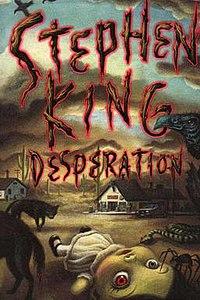
Desperation was published in 1996 at the same time as The Regulators, with the former being attributed to King and the latter to Richard Bachman. It was King’s grand experiment to take the same set of characters and villains and place them in parallel universes, with the events of one novel vaguely mirroring the events of the other. I read and liked both of them at the time, Desperation more so than The Regulators. Today, however, I remember literally nothing about The Regulators other than that it takes place in the suburbs. As for Desperation, here’s what I remember about the plot, with my summary having been written prior to watching the movie:
My Half-Remembered Plot Summary, Based On Reading the Book Over 20 Years Ago
Various passengers on an isolated highway are pulled over by a menacing cop and forcefully taken to holding cells in a nearby town called Desperation. Police brutality much? Except the cop’s not really human anymore. He’s – and stop me if you’ve heard this about a King villain before – a living embodiment of evil. (Think of Clancy Brown in Pet Sematary 2 mode.) Something demonic or possibly extraterrestrial is working through him and bringing the people to the town for some reason. Correction: some nefarious reason.
In classic King fashion, the main hero of the piece turns out to be a little kid with some kind of psychic powers. The ensemble includes a struggling writer. The climax takes place in a mineshaft. It all turns into a commentary on religion, the erosion of the American character, and the ghosts of our imperialistic past.
What Happens In The Movie
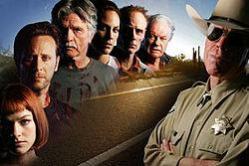
Basically, all of that. The cop is played by a scenery-chewing Ron Perlman. Tom Skerritt satisfies the Stephen King Madlib nature of the plot by playing the obligatory random author. The ensemble is filled out with a roadie (Steven Weber), the hitchhiker he picks up (Kelly Overton), a grieving mother and father (Matt Frewer, Sylvia Kelegian), a local veterinarian (Charles Durning), and couple just trying to pass through the God-forsaken town (Henry Thomas, Annabeth Gish). The ancient evil is a demon, not extraterrestrial, and it was re-released into the world when the nearby mining shift was reopened.
The kid, David Carver (Shane Haboucha), has no real explicitly psychic powers. He’s just been touched by God and is frequently visited by what appears to be the ghost of his newly dead sister. The appearance of “Redrum” on a wall during one of David’s ghostly chats hints that he might actually have a “shining” ability which he has mistakenly interpreted as being him talking to God. Then again, it might just be an easter egg. The film never really delves deeper than that.
The Mick Garris Factor

Given all of this talk of religion, it’s easy to lose sight of the fact that at its core Desperation has a fairly classical horror movie set-up:
- Out-of-towners traveling through the Nevada desert are picked off one by one? How very Hills Have Eyes.
- They end up in a small town where everyone has been mysteriously murdered? How very Phantoms.
- It’s all a metaphor for the sins of history, with the demonic entity standing in for all the horrible things American mineshaft owners did to Chinese laborers? How very…well, take your pick. As Joe Dante bluntly put it in Monsters in Movies, “All monsters are metaphors.”
Based on Mick Garris’ ongoing horror-themed podcast Post Mortem, I’d guess none of this was lost on him. He is a genuine horror devotee who will tell you all about the time he filmed the “making of” documentary for The Thing just as quickly as he’ll heap praise upon the works of just about anyone you can imagine from horror movie history. However, Garris is the definition of a frustratingly likable director – you like the filmmaker but not always his films. Or, in Garris’ case, his various TV movies and mini-series.
This has put Stephen King fans in a bit of a bind for over a decade. After cutting his teeth on horror movies like Critters 2 (which I love, btw) and Psycho IV, Garris became the guy who exclusively directed and usually also wrote Stephen King adaptations – the good (The Stand), the meh (The Shining), and the truly ugly (Sleepwalkers).
So, when you see Mick Garris’ name attached to Stephen King’s Desperation it just makes sense. Similarly, if you tell me Desperation isn’t very good that pretty much checks out. It’s not one of King’s finest novels, and it was entrusted to someone who trades in making far-too-often blandly passable Stephen King movies and mini-series. Not a great combination, obviously.
However, there’s something uniquely – wait for it – desperate about Desperation. Judging by the way he goes insanely overboard with a wide angle lens, dutch angles, and almost comical close-ups, Garris seems to be wildly overcompensating for having allowed his career to be defined by King’s work. 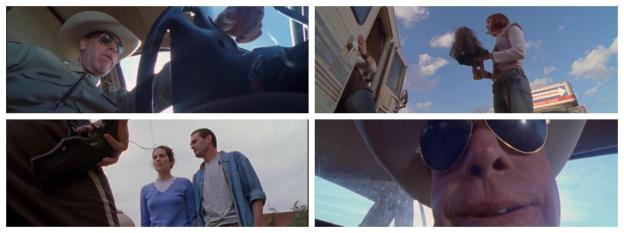 It’s like he’s trying to Poochie-ify his normally rather televisual filming style:
It’s like he’s trying to Poochie-ify his normally rather televisual filming style:
Or, to be more scholarly about it, maybe he’s trying to film from the point of view of all the creepy crawlers working in service to the demon we’ll later learn to call Tak. Even if so, those dots are never really connected, meaning Desperation is a film which just looks off for no good reason.
From 30 to 12
The production history might shine some light on this. According to Stephen King Films FAQ, Desperation was meant to be Garris and King’s next project after 1997’s The Shining. New Line gave them the green-light in 1998, based on King’s script adaptation.
Then King was hit by a van and almost died. Bummer. Obviously.
Despite all of that, Desperation remained in contention at New Line. That is until the budget ballooned to an unseemly $30 million, at which point the studio put it in turnaround. For several years after that, Garris and King struggled to find any new takers, possibly due to the industry’s creeping reservations about the director. As King told Fangoria, “What I’m saying is that if you want to make a deal on Desperation, first you have to do a Mick Garris picture. That’s the deal – take both, or take neither.”
The industry opted for “neither.”
Eventually, however, ABC stepped up to the plate and offered to make Desperation for around a third ($12 million) of what Garris had hoped to get out of New Line ($30 million). ABC asked for a two-night mini-series; Garris was determined to make a TV movie instead. Neither party ended up truly getting what they wanted out of the deal.
A Sad End for the ABC-King Partnership
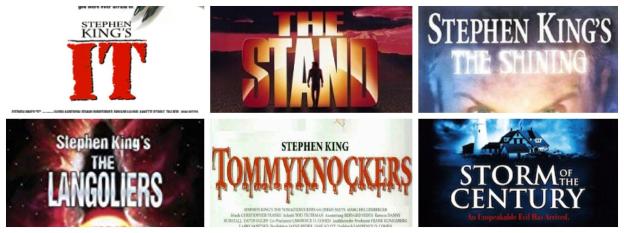 Prior to Desperation, ABC and Stephen King had been good to each other over the years. For the entirety of the 90s and even into the early 2000s, tuning into a new Stephen King mini-series on ABC during sweeps week was practically an annual tradition. Good, bad, or otherwise, each new mini-series was a cultural event, a water cooler show in a time when that was still a thing.
Prior to Desperation, ABC and Stephen King had been good to each other over the years. For the entirety of the 90s and even into the early 2000s, tuning into a new Stephen King mini-series on ABC during sweeps week was practically an annual tradition. Good, bad, or otherwise, each new mini-series was a cultural event, a water cooler show in a time when that was still a thing.
I watched ‘em all – It, The Tommyknockers, The Langoliers, The Shining, Storm of the Century. That doesn’t mean I loved every minute of it. Tommyknockers and Langoliers, in fact, left me longing for temporary amnesia so I could wipe them from my memory. However, as a genre fanatic and budding Stephen King superfan each new ABC mini-series commanded my attention.
More than that, they shaped me and inspired me. When I watched The Stand, I was forever filled with anxiety over disease outbreak, a trait which came in handy as an adult when I worked in public health research during an Avian Flu scare. When I learned they had filmed The Shining at The Stanley Hotel in Estes Park, Colorado, I begged my dad to take me there just so I could stand where Steven Weber had taken a mallet to Rebecca De Mornay’s stomach. (I might have been an awful kid.)
The last time I actually remember truly liking and looking forward to one of these events, however, was in 1999 for Storm of the Century, a Twilight Zone-esque story about a mysterious visitor to an isolated, snow-battered small town. It was a big deal at the time because it wasn’t actually based on a Stephen King novel. Instead, he wrote it as an original screenplay, which was then published in conjunction with the airing of the mini-series. Considering that this was a time when it was still a novel concept to publish a screenplay, Storm of the Century rang as unique from a marketing perspective and simply pulpy fun from a storytelling standpoint.
This would be ABC and King’s last true hurrah together. The 2000s brought one disappointment (Rose Red) after another (Kingdom Hospital). That ABC would swoop in to save Desperation was a testament to its long-standing relationship with King. What the network ended up doing with Desperation, however, killed that relationship for good.
Decaying American Soul vs. American Idol
 Filmed primarily in mining town Brisbee, Arizona in 2004, Desperation was meant to air during the May 2005 sweeps period. However, the rather arduous shoot, including one incident involving a dangerous fireball erupting in the mine, delayed post-production long enough that Garris’ cut wasn’t ready in time for the target date. So, ABC chose to sit on it for an entire year, postponing Desperation until May 2006 sweeps when it would air against American Idol.
Filmed primarily in mining town Brisbee, Arizona in 2004, Desperation was meant to air during the May 2005 sweeps period. However, the rather arduous shoot, including one incident involving a dangerous fireball erupting in the mine, delayed post-production long enough that Garris’ cut wasn’t ready in time for the target date. So, ABC chose to sit on it for an entire year, postponing Desperation until May 2006 sweeps when it would air against American Idol.
King, to put it mildly, was displeased. He posted the following on his website prior to the film’s debut:
“Those of you who are familiar with the wonderful world of television may have noticed that Desperation – probably the best TV movie to be made from my work – has been scheduled by ABC to run, not just against American Idol, but against the American Idol finals! When I see this kind of scheduling, my heart is warmed by how well I have been treated by my friends at ABC. One can truly say that with friends like this, one doesn’t need enemas. Little joke there. But am I bitter? HELL, YES, I AM BITTER!”
As anyone who remembers King’s regrettable old Entertainment Weekly columns can tell you, the dude wears “bitter old man” proudly. In this case, however, his trepidation was justified. As he feared it would, Desperation was absolutely crushed by American Idol. That’s despite starring a post-Hellboy Ron Perlman as the villain and receiving OK reviews. Here’s what New York Magazine had to say about it: “But what makes Desperation special-effective is writing, acting, direction, and the sense that these people know something.”
At the time, I was barely even aware of Desperation’s existence. I knew the book, obviously, and I think I saw literally one single commercial for the movie. In a post-Rose Red world, however, I was just done with King for a good long while. I skipped Desperation then, meaning I don’t know how well it would have played at the time. Looking at it now, Desperation feels like the product of a creative and business relationship running on fumes.
It’s Not All Bad
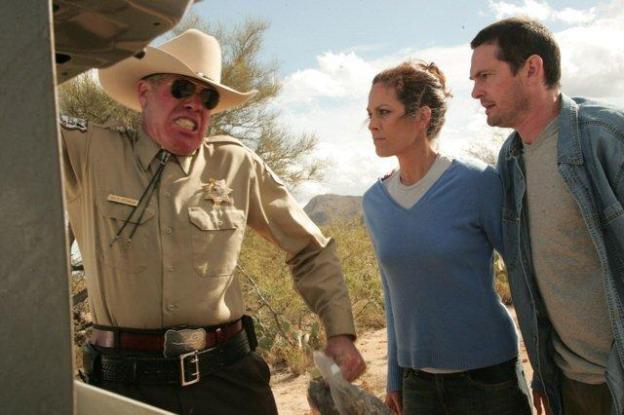 To be fair, Garris does score some creativity points for a sequence which finds a rather cinematic way – sepia-toned serials viewed through a Nickelodeon machine – to cut to an exposition-filling flashback.
To be fair, Garris does score some creativity points for a sequence which finds a rather cinematic way – sepia-toned serials viewed through a Nickelodeon machine – to cut to an exposition-filling flashback.
Moreover, the opening scene – Gish and Thomas being pulled over and taken away by Perlman’s abusive, redneck cop after he plans weed in their trunk – is solid horror 101 material, in theory. The same can be said about the ensuing surprise death which establishes the stakes as well as our subsequent introduction to the motley ensemble. However, due to Garris’ abrasive direction and King’s often groan-worthy scripting (Sample dialogue: “What do you think this is, Anthropology 101?”) everything about this seems off. That feeling never goes away.
For example, there’s a moment where David quietly drops to his knees to pray in his jail cell and his mother reacts as if he’s been wounded. As she ratchets up the motherly concern, those around her look on with solemn, grim understanding. The inspirational score swells. Gish weighs in from a neighboring cell:
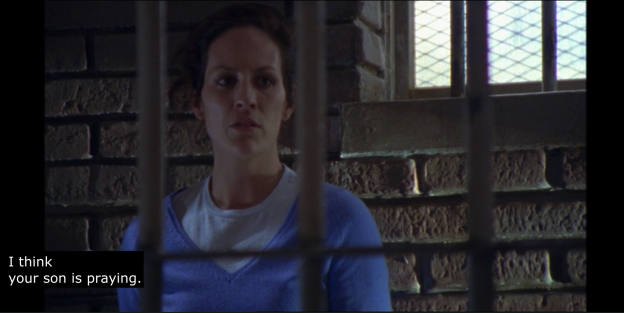
It’s not quite a Seinfeld “what is this salty discharge?” meme, but it’s far closer than it should be. The same goes for a later moment when Steven Weber is attacked by the fakest-looking feline arm since Toonces the Driving Cat.
Awkward scripting and B-Movie effects are normally forgivable sins if the film has the right tone. Not Desperation, which aches so hard to be about some pretty heady ideas that the seams are as obvious as the cuts on Perlman’s face.

Eventually, the one thing Desperation has going for it – Perlman’s over-the-top performance – all but disappears. In the second hour, he’s replaced by an assortment of zombies and animals. One of the zombies gets half her face scratched off, which does look pretty gnarly, but it’s the type of thing you latch onto whenthe pickings are so slim.
King, as I quoted, blamed Desperation‘s failure on American Idol. However, there’s always an alternative explanation beyond “the competition” for a movie’s commercial failure, and that explanation is usually “maybe it just isn’t that good.” That sadly fits Desperation. As of this writing, it’s the last thing King ever did with ABC and second-to-last with Garris, bringing a sad end to a once fruitful partnership.
Quoting T.S. Elliot, King opens The Stand with the following: “This is the way the world ends. Not with a bang but a whimper.” In that context, both Elliot and King meant those words to carry apocalyptic meaning. However, when applied to the long lost art of the ABC-Stephen King collaboration Desperation is the whimper to what once began with such a bang.
What should I watch next: Cujo, The Dead Zone or The Night Flyer?

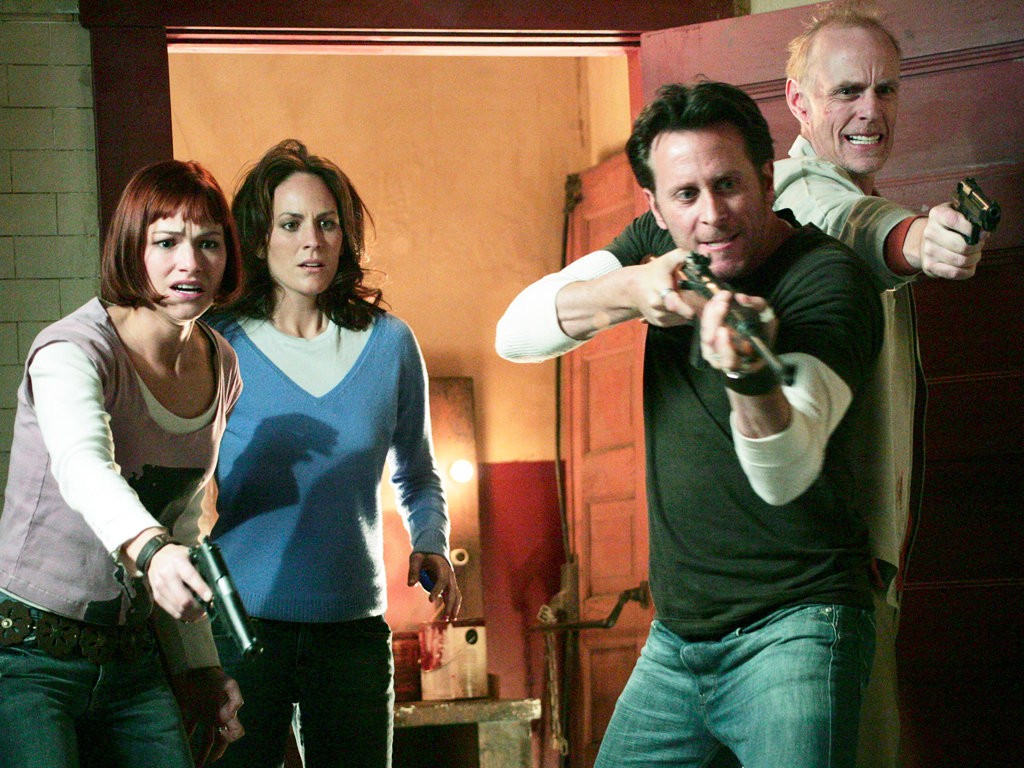

Are you not entertained?!?
Next watch Quicksilver Highway! Just kidding, even I can’t enjoy that one.
I heard about the remake of Salem’s lot by The Conjuring guy, James Wan. Are y’all gonna talk about that?
I saw that too. It kind of got buried under our Marvel coverage/Endgame anticipation. I do have some thoughts about it though. Can share them tomorrow or the day after..